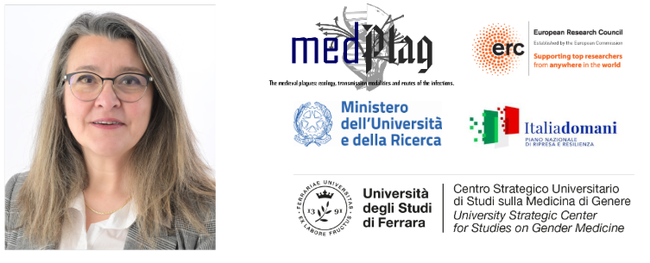Barbara Bramanti

Barbara Bramanti, Antropologa biologica e molecolare, è professoressa ordinaria di Antropologia Biologica. L’attività didattica di Bramanti si estende a diversi Corsi di Studio della Facoltà di Medicina, Farmacia e Prevenzione e del Dipartimento di Studi Umanistici. Dal 2018 è Componente del Consiglio Direttivo del Centro Strategico Universitario di Studi sulla Medicina di Genere dell’Ateneo. Dal 2022 è una delle Delegate di Facoltà all’Internazionalizzazione. Dal 2023 è la Direttrice del Master di II livello in Scienze geo-archeo-antropologiche forensi. Ha lavorato per oltre 20 anni in Germania (Georg-August-Universität Göttingen e Johannes-Gutenberg-Universität, Mainz) e Norvegia (Centro di Eccellenza Centre for Ecological and Evolutionary Synthesis, CEES, University of Oslo), dove ha diretto progetti di rilievo di Antropologia molecolare ed Evoluzione, utilizzando in particolare le metodiche del DNA antico. Dal 2013 al 2018 è stata PI dell’ERC Advanced Grant MedPlag - The medieval plagues: ecology, transmission modalities and routes of the infections (FP7-IDEAS-ERC, 324249), e con il suo gruppo ha indagato la genomica, l’ecologia e l’epidemiologia delle epidemie storiche di peste. È autrice di articoli in prestigiose riviste internazionali (fra cui Science, PNAS, PLOS Pathogens, Proceedings of the Royal Society B, Scientific Reports, ecc.) e di contributi in volume.
Da decenni è attiva nella diffusione della cultura scientifica al pubblico nazionale ed internazionale con la partecipazione a documentari scientifici, interviste, mostre, webinar, podcast e ted-talk.
Barbara Bramanti, biological and molecular anthropologist, is a full professor of Biological Anthropology. Bramanti's teaching activities extend to various degree programmes of the Faculty of Medicine, Pharmacy and Prevention and the Department of Humanities. Since 2018, she has been a member of the Executive Board of the Strategic University Centre for Gender Medicine Studies. Since 2022, she has been one of the Faculty Delegates for Internationalisation. Since 2023, she has been the Director of the Level II Master's Degree in Forensic Geo-Archaeological-Anthropological Sciences. She has worked for over 20 years in Germany (Georg-August-Universität Göttingen and Johannes-Gutenberg-Universität, Mainz) and Norway (Centre for Ecological and Evolutionary Synthesis, CEES, University of Oslo), where she has directed major projects in molecular anthropology and evolution, using ancient DNA methods in particular. From 2013 to 2018, she was PI of the ERC Advanced Grant MedPlag - The medieval plagues: ecology, transmission modalities and routes of the infections (FP7-IDEAS-ERC, 324249), and with her group she investigated the genomics, ecology and epidemiology of historical plague epidemics. She is author of articles in prestigious international journals (including Science, PNAS, PLOS Pathogens, Proceedings of the Royal Society B, Scientific Reports, etc.) and contributions to books.
For decades, she has been actively promoting scientific culture to national and international audiences through her participation in scientific documentaries, interviews, exhibitions, webinars, podcasts, and TED Talks.
